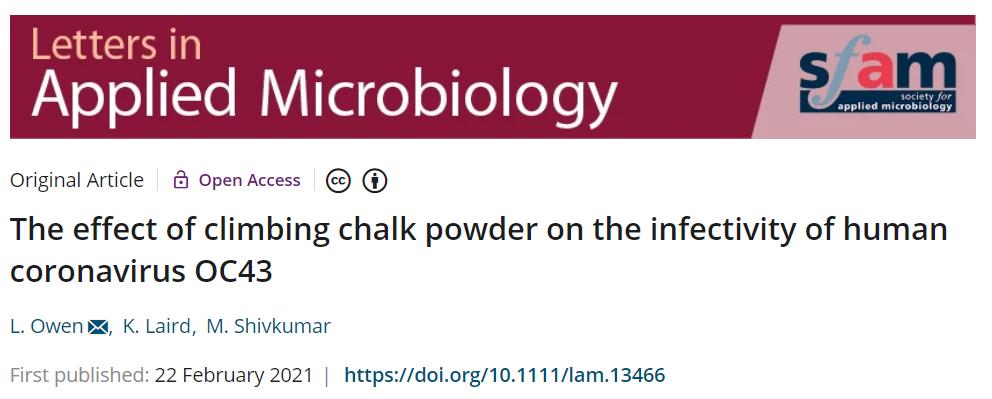Chalk research now peer-reviewed and results upheld
- Tuesday 13th April 2021
The De Montford University research into the efficacy of chalk with respect to the Coronavirus has been peer-reviewed and the findings upheld.

In the spring of 2020 when the Coronavirus pandemic first hit the UK a working group was set up to look at the effects of chalk on the model coronavirus SARS-CoV-2. The commissioning group, Warehouse Climbing Centre (Gloucester), The Lakeland Climbing Centre (Kendal) and the Association of British Climbing Walls (ABC), were particularly interested in the science behind chalk and the virus, especially how chalk on holds may act as a reservoir for the virus.
The working group have reported on the research they commissioned.
“The team at De Montfort University were commissioned to undertake the research to assess whether coronavirus can survive in climbing chalk and if it remains infectious to people. The research was led by Dr Katie Laird (Head of the Infectious Disease Research Group), Dr Maitreyi Shivkumar (Virologist) and Dr Lucy Owen (Postdoctoral Researcher).
A model coronavirus for SARS-CoV-2, human coronavirus OC43, was used for the experiments. The presence of infectious virus on a plastic surface dusted with chalk was monitored over the course of one hour. The results indicated that the amount of infectious virus was reduced by around 99% immediately upon contact with the chalky surfaces. By comparison, the control test where no chalk dust was present, showed only a slight decline in infectious virus over these time periods.”
More details have been released on the methodology of the research.
“The researchers dusted dry plastic surfaces with different chalks (magnesium carbonate, calcium carbonate, or a blend of the two) and added droplets of a model coronavirus called HCoV-OC43, which has a very similar structure and survival pattern to that of SARS-CoV2 (which causes COVID-19). Then, over the course of an hour, they recovered the virus from the surfaces at several intervals to inspect the number of infectious virus particles present.”
The results were particularly encouraging and excellent news for indoor climbers and climbing walls.
“Within just one minute of the virus coming into contact with the chalk, the number of infectious particles in all of the samples was reduced by more than 99%.”
Specifically, Dr Shivkumar said: “Rather than just looking at whether the virus was still present in the chalk, we wanted to explore if any virus that comes into contact with chalk still posed a risk of infection. Our study suggests that chalk powder inactivates infectious virus and is therefore unlikely to harbour coronaviruses like SARS-CoV-2.”
The results were announced in the summer of last year and the finding released prior to peer review. That research has now been subject to peer review and the results have been upheld. This is particularly good news for everyone connected to and who participates in indoor climbing as Rich Emerson, Chair of the ABC said: “These results look fantastic and show chalk could once again be the climber’s best friend. We hope that it will provide comfort to our customers as they return to climbing at indoor walls. We will not lessen all our other COVID-safe measures such as regular hand sanitisation and social distancing but this extra factor should temper fears that chalky handholds could be vectors of the disease. I would like to thank David and Robert Stevens of The Warehouse and Jeremy Wilson of The Lakeland Climbing Centre for this research initiative. "
To recap, the newly approved research by scientists at De Montfort University Leicester (DMU) shows the amount of infectious SARS-CoV-2 was reduced by around 99% immediately upon contact with chalky surfaces. The fully peer-reviewed version of the research is now live here…